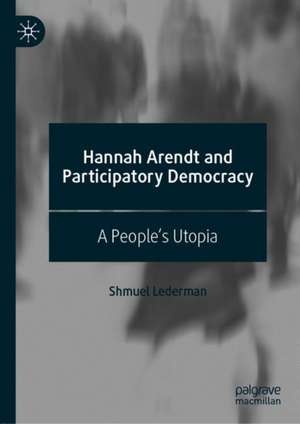Hannah Arendt and Participatory Democracy: A People's Utopia
Autor Shmuel Ledermanen Limba Engleză Hardback – 21 mar 2019
The main argument of the book is that the council system, or more broadly the vision of participatory democracy was far more important to Arendt than is commonly understood. Seeking to demonstrate the close links between the council system Arendt advocated and other major themes in her work, the book focuses particularly on her critique of the nation-state and her call for a new international order in which human dignity and “the right to have rights” will be guaranteed; her conception of “the political” and the conditions that can make this experience possible; the relationship between philosophy and politics; and the challenge of political judgement in the modern world.
Preț: 585.90 lei
Preț vechi: 689.29 lei
-15% Nou
Puncte Express: 879
Preț estimativ în valută:
112.11€ • 117.37$ • 92.76£
112.11€ • 117.37$ • 92.76£
Carte tipărită la comandă
Livrare economică 08-22 aprilie
Preluare comenzi: 021 569.72.76
Specificații
ISBN-13: 9783030116910
ISBN-10: 3030116913
Pagini: 200
Ilustrații: XII, 254 p. 1 illus.
Dimensiuni: 148 x 210 mm
Greutate: 0.47 kg
Ediția:1st ed. 2019
Editura: Springer International Publishing
Colecția Palgrave Macmillan
Locul publicării:Cham, Switzerland
ISBN-10: 3030116913
Pagini: 200
Ilustrații: XII, 254 p. 1 illus.
Dimensiuni: 148 x 210 mm
Greutate: 0.47 kg
Ediția:1st ed. 2019
Editura: Springer International Publishing
Colecția Palgrave Macmillan
Locul publicării:Cham, Switzerland
Cuprins
Chapter 1: Introduction.- Chapter 2: Federations, Councils, and the Origins of Totalitarianism.- Chapter 3: Democracy and the Political.- Chapter 4: Philosophy, Politics, and Participatory Democracy in Arendt.- Chapter 5: The Actor does not Judge: Arendt’s Theory of Judgment.- Chapter 6:Facing the Banality of Evil: Arendt’s Political Response to Eichmann.- Chapter 7: The Social and the Political.- Chapter 8: Arendt and the Council Tradition.- Chapter 9: Arendt and the Current Participatory Moment.- Chapter 10: Conclusion: A People’s Utopia.
Notă biografică
Dr. Shmuel Lederman is a teaching fellow in the Department of History, Philosophy and Judaic Studies at The Open University of Israel, and in the Weiss-Livnat International MA Program at the University of Haifa, Israel. He has published extensively on the political thought of Hannah Arendt in prominent journals in political theory as well as in genocide studies. This is his first book.
Textul de pe ultima copertă
This book centers on a relatively neglected theme in the scholarly literature on Hannah Arendt's political thought: her support for a new form of government in which citizen councils would replace contemporary representative democracy and allow citizens to participate directly in decision-making in the public sphere.
The main argument of the book is that the council system, or more broadly the vision of participatory democracy was far more important to Arendt than is commonly understood. Seeking to demonstrate the close links between the council system Arendt advocated and other major themes in her work, the book focuses particularly on her critique of the nation-state and her call for a new international order in which human dignity and “the right to have rights” will be guaranteed; her conception of “the political” and the conditions that can make this experience possible; the relationship between philosophy and politics; and the challenge of political judgement in the modern world.
The main argument of the book is that the council system, or more broadly the vision of participatory democracy was far more important to Arendt than is commonly understood. Seeking to demonstrate the close links between the council system Arendt advocated and other major themes in her work, the book focuses particularly on her critique of the nation-state and her call for a new international order in which human dignity and “the right to have rights” will be guaranteed; her conception of “the political” and the conditions that can make this experience possible; the relationship between philosophy and politics; and the challenge of political judgement in the modern world.
Caracteristici
Focuses on a relatively neglected theme in the scholarly literature on Hannah Arendt's political thought Makes novel and unexpected connections between the council system Arendt advocated and other major themes in her work Highlights the key interdisciplinary concept “space” as a feature of Arendt’s thought that had been under appreciated
